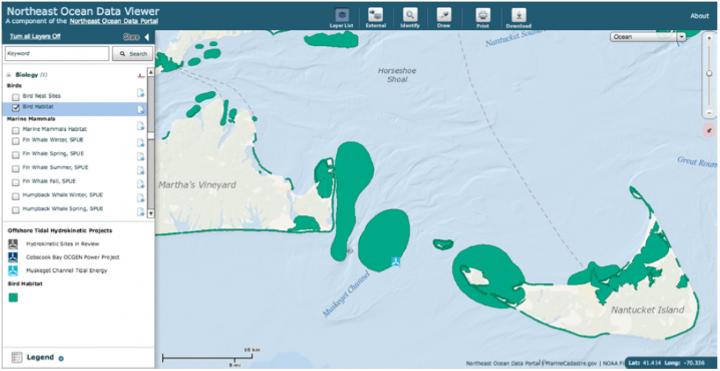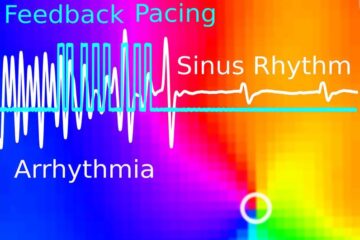'Ecosystem services' help assess ocean energy development

Public data sources from the Northeast Ocean Data portal help determine the impact of a new tidal energy project between Martha's Vineyard and Nantucket. Green areas show show coastal bird habitat. Credit: Leslie lab/Brown University
“Ecosystem services are the benefits provided by functioning ecosystems to people,” wrote environmental scientist Heather Leslie, the Peggy and Henry D. Sharpe Assistant Professor of Environmental Studies and Biology, in the current edition of the >Marine Technology Society Journal.
The study, written with former undergraduate student Megan Palmer, who is now with the Nature Conservancy, begins with a review of nearly 300 papers on marine and hydrokinetic (MHK) power systems. Only 36 focus on tidal power and of those only a handful specifically address ecosystem concerns, the authors found.
While developers are required to perform environmental studies before installing tidal energy harvesting devices, those wouldn't necessarily encompass the full range of connections between people and marine environments.
“The ability to explicitly link ecosystem health (or functioning, as ecologists often refer to it) and benefits to people is one of the notable differences between an ecosystem services analysis and a typical environmental impact statement,” Leslie said.
To illustrate how ecosystem services might be applied to a project, Leslie and Palmer looked at the Muskeget Channel Tidal Energy Project, which is planned for a site south of Cape Cod, between Martha's Vineyard and Nantucket. After some analysis, the pair identified biodiversity, tourism and recreation, and food provision as the most important ecosystem services to assess.
Drawing on public data sources available through interactive Northeast Ocean Data portal, they illustrate that while the area of the channel where the power project is planned is likely an important area for coastal birds, such as terns and gulls, it might not be especially crucial for tourism and recreation or food provision.
The case study therefore suggests that the project would benefit from studying how the tidal energy infrastructure may affect the birds and their food resources, in order to better assess how the area's ecosystems and the services they provide to people are likely to be affected by the development. For instance, if the energy infrastructure enhances local fish populations, it could in turn enhance bird populations, which could have effects on both the coastal marine food web and nature-dependent recreational activities like bird-watching.
“An ecosystem services approach enables researchers and energy developers to create an integrative description of the possible environmental and socioeconomic impacts of a particular project, which in turn can help inform project planning, implementation and monitoring,” Leslie and Palmer concluded.
Media Contact
All latest news from the category: Ecology, The Environment and Conservation
This complex theme deals primarily with interactions between organisms and the environmental factors that impact them, but to a greater extent between individual inanimate environmental factors.
innovations-report offers informative reports and articles on topics such as climate protection, landscape conservation, ecological systems, wildlife and nature parks and ecosystem efficiency and balance.
Newest articles

Wildfire danger to increase due to climate change
WSL Institute for Snow and Avalanche Research (SLF) researchers expect an elevated wildfire danger in the Alpine Foreland from 2040 onwards due to changing meteorological conditions. The danger currently remains…

Advanced Brain Science Without Coding Expertise
Researchers at Helmholtz Munich and the LMU University Hospital Munich introduce DELiVR, offering a new AI-based approach to the complex task of brain cell mapping. The deep learning tool democratizes…

Gentle defibrillation for the heart
Using light pulses as a model for electrical defibrillation, Göttingen scientists developed a method to assess and modulate the heart function. The research team from the Max Planck Institute for…





















